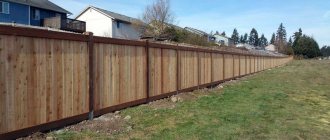The owner of a land plot has the right to independently dispose of his own property, including using the allotment for the construction of outbuildings or residential buildings.
However, construction requires careful adherence to legal requirements, otherwise you may face unpleasant consequences.
In order to prevent negative developments, it is worth separately considering neighbors’ permission for construction - when it is needed and how to obtain it.
When is consent required?
There is no need to obtain permission from a neighbor to erect a building if:
- all technical, sanitary and other requirements of regulatory documents are met;
- there are no facts of violation of the rights and interests of third parties;
- there is no threat to human life and health.
The common position according to which permission from a neighbor is required when constructing a property with a smaller setback from the fence (for example, no closer than three meters from the fence when building a residential building) is not considered justified.
Such an interpretation implies legitimizing the violation, which directly contradicts the principles of legislation.
The need to coordinate the nuances of building construction arises in strictly defined cases:
Each subject of the Russian Federation provides additional requirements for construction, which may confirm the need to obtain permission from a neighbor.
As an example, in the Urban Design Standards of the Stavropol Territory (approved by order of the Ministry of Construction, Road Facilities and Transport of the Stavropol Territory No. 295-o/d of 2021) in Section I, Part 6, paragraphs. 6.5 states that when constructing yard toilets on the territory of a private household, the setback established by the standards can be reduced if the issue is agreed upon with neighbors.- According to SP 42.13330.2016, it is possible to block residential or commercial buildings on adjacent land plots (blocking is a common wall of buildings). However, this is permissible only if two conditions are met: mutual agreement is reached between the neighbors, and all fire safety requirements are met.
Often, a neighbor’s consent to construction is required by officials when issuing a permit for the construction of a property. In most cases, such requests are not justified, but it is much easier to obtain a document than to argue with officials.
Neighbor's consent to construction along the boundary sample
Often, even during the construction process, disputes arise between neighbors over the boundaries of the site. You also need to obtain permission to build an outbuilding, and it is advisable. Although SNPs are mostly advisory in nature, any owner can file a lawsuit for violation of building rules by a neighbor, and then the violator will not have a good time.
After all, if someone builds a five-story house in a residential area of private households, the neighbors will not be much happy from this construction! Russian legislation requires coordination of construction with neighbors only if the land plot belongs to them; in the same case, if the neighbors are tenants of the plot, then it is necessary to apply for approval only to the owner of the land plot. I know one thing: when you line up, then if suddenly the neighbors decide to sue, it will be impossible for the neighbors. What distance must there be permission from neighbors to build a garage at. What do you think, Galkin took permission from all his neighbors? What kind of bullshit is this? If I have money to build a house, then I will build it.
We recommend reading: Mortgage insurance online Sberbank
How to obtain approval?
The regulations do not contain specific requirements for the document. And yet, when drawing up a neighbor’s consent to construction, it is important to take into account a number of rules:
- presentation style – formal and businesslike;
- Errors are not allowed, especially in personal data;
- the use of unreliable or false information in the future may result in criminal prosecution;
- the document should be notarized to reduce the risk of claims from a neighbor in the future;
- the moment requiring approval must be described in detail and accurately in accordance with regulatory documents;
- The content must include personal information about the parties to the transaction.
Despite the absence of a specific form of permission in the legislation, the generally accepted model should be used, if necessary, adjusting individual provisions.
In what cases is a permit required?
Written consent for construction from neighbors will be required in the following cases:
- If construction is planned with a smaller distance between the building being constructed and the fence on the border.
- If the reconstruction will affect communications common with neighbors.
- Carrying out noisy construction work on weekdays and weekends, as this will disturb the peace of neighbors.
Consent must be in writing. An oral agreement has no legal force, and it is hardly possible to exclude the option of subsequent litigation.
What should I include in the document?
When drawing up a document, a number of mandatory information must be specified in the content:
Information about homeowners located in the neighborhood: full name, passport details and addresses of owned properties.- Details of real estate documents to confirm ownership.
- Clarification of the agreed subject of the dispute with an indication of compliance with urban planning requirements.
- Date of document execution.
- Signature of each owner with transcript.
The consent must be accompanied by documents confirming the positions specified in the permit. You will also need to provide a diagram of the land plot on which the facility is planned to be built.
The content of the consent can be supplemented with other items - the amount and nature of information that needs to be added largely depends on the circumstances.
RAA Law
Consent for the reconstruction of a residential building. The owner of a land plot can erect buildings and structures on it, carry out their reconstruction or demolition, and permit construction on his plot to other persons. These rights are exercised subject to compliance with urban planning and construction norms and rules, as well as requirements regarding the intended purpose of the land plot (clause 2 of Article 260 of the Civil Code of the Russian Federation).
Unless otherwise provided by law or agreement, the owner of a land plot acquires the right of ownership to a building, structure and other real estate erected or created by him for himself on the plot owned by him. The consequences of unauthorized construction carried out by the owner on a plot of land belonging to him are determined by Article 222 of the Civil Code.
I, gr. KULAGIN VALERY PETROVICH, born 08/18/1968, place of birth _____________, citizen of the Russian Federation, gender _____, passport 03 03 989898, issued by the PVS Department of Internal Affairs of the ___________ district of the city. Moscow 02/12/2002, department code 232-002, registered: city. Moscow, st. Tolbukhina, house No. 46, apt. No. 54, I give my consent to Dyachenko Alexander Alexandrovich for the reconstruction of a residential building with an area of 105.4 sq.m., including a living area of 54.2 sq.m., letter I, number of floors 2, inventory number 11222-789, located at : mountains Moscow st. Lenin building 65, with internal redevelopment of the house without changing the size of the residential building (area of the residential building), located at the above address. Contents of Art. 263 Civil Code of the Russian Federation, art. 40 of the Land Code of the Russian Federation were explained to me by a notary.
What to do if they don’t give it?
If it is not possible to come to an agreement with the neighbor, the builder will have to act in full compliance with the provisions of the standard urban planning regulations.
If, for justified reasons, it is not possible to implement the regulatory requirements, the owner has the right to go to court to obtain an appropriate decision .
However, achieving a positive verdict on such a claim will be very difficult. You will have to take part in legal proceedings and justify the need to satisfy the position of the application.
In addition to the costs of the claim and collection of documents, you may have to incur costs for a lawyer, an independent expert and other specialists. Therefore, it is recommended to try to reach an agreement with your neighbor peacefully.
Construction of a second floor without the consent of the owner
Maxim80 wrote: The situation is as follows. There is a house divided into 4 parts, each with its own entrance. According to the documents, during privatization, parts of the house were decorated as apartments for some reason. 2 neighbors built a second floor for themselves. They didn’t have any problems with the design, the neighbor drank blood due to natural harmfulness and character))) But that’s not the point, I also want to build a second floor. According to the documents, my apartment has 3 owners, each with 1/3. That year we talked about construction, no one was against it. And recently, one owner stated that he was not satisfied with this situation and that I would not receive consent to build a second floor. Can I build a second floor without permission and then register what was built in my name? One day I was surfing the city court website and found a sample claim to the court for an increase in the share of property. Those. Roughly speaking, if I increased the area of housing at my own expense, then through the court I can demand an increase in my share of property. How does this apply to my situation?
The situation is as follows. There is a house divided into 4 parts, each with its own entrance. According to the documents, during privatization, parts of the house were decorated as apartments for some reason. 2 neighbors built a second floor for themselves. They didn’t have any problems with the design, the neighbor drank blood due to natural harmfulness and character))) But that’s not the point, I also want to build a second floor. According to the documents, my apartment has 3 owners, each with 1/3. That year we talked about construction, no one was against it. And recently, one owner stated that he was not satisfied with this situation and that I would not receive consent to build a second floor. Can I build a second floor without permission and then register what was built in my name? One day I was surfing the city court website and found a sample claim to the court for an increase in the share of property. Those. Roughly speaking, if I increased the area of housing at my own expense, then through the court I can demand an increase in my share of property. How does this apply to my situation?
12 Jun 2021 uristlaw 557
Share this post
- Related Posts
- In Which Program to Keep Accounting Accounting for the Bar Association?
- If I do not take advantage of the benefit of free travel on public transport, compensation for this is possible
- If you open an account in another region, it may be arrested by bailiffs
- Veteran of Labor Enterprises What Labor Benefits
What are the consequences for uncoordinated construction?
If you do not promptly obtain permission from your neighbor for construction in cases provided for by law, such carelessness can cause a number of negative consequences:
- collection of significant fines;
- refusal to issue a building permit;
- inability to register a property;
- the need to compensate for damage (moral and material) caused to neighbors as a result of illegal construction.
Also, under Article 304 of the Civil Code of the Russian Federation, a homeowner whose rights have been violated may demand the demolition of an illegally erected building.
What will happen if you don’t get your neighbors’ consent to build, the video tells:
You can find out what documents are required to obtain a building permit here.
Everything about the house and life in it
Permission from neighbors to redevelop an apartment can be obtained as a result of a positive decision at a general meeting of all homeowners (members of the housing cooperative) or after individual agreements with each apartment owner. It is allowed to draw up both a collective permit and separate individual consents of each owner.
- dismantling the entrance doors to the apartment and installing new ones.
- Changes to the facade of the building, reconstruction of the balcony.
- Increasing the area of the apartment due to the common ownership of all residents.
- Changing the location of window and door openings, etc.
Design rules
The possibility of locating the building near the fence is being discussed, and the distance between these objects will be less than three meters. If the neighbor agrees to such construction, then he draws up a corresponding consent.
For its correct formation, some rules are taken into account:
- it is allowed to use any form to compile it, but it is still recommended to view the sample indicated above;
- experts advise additionally contacting a notary to certify it, and this is considered especially important if a neighbor sells his property to another person in the future, and the new owner does not agree with the construction of an object next to his property;
- The consent must contain accurate and reliable information about the sites and the parties themselves so that they can be easily identified.
If you do not receive this document before the actual start of construction, this will lead to the fact that neighbors may file a claim in court, so you will have to pay a fine or demolish the unfinished object.







